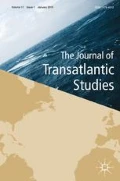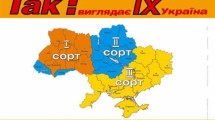Abstract
This article analyses responses by various British and American writers to the Spanish Civil War, and examines the various personal and political crusades that can be observed in this writing. I will examine Hemingway’s For Whom the Bell Tolls (1941), George Orwell’s Homage to Catalonia (1938), the Spanish Civil War poetry of Langston Hughes, and various lesser-known British and American poets. I argue that the British poetic response was largely an attempt to understand and align themselves with the fragmented Loyalist Communism, and that American poetry of this war often raged against US neutrality. I will demonstrate that this US policy of neutrality changed after the Spanish Civil War, US administrations attaching themselves to varying forms of crusade on a consistent basis both during and after the Second World War, twenty years after their crusade in the Great War.
Similar content being viewed by others
Notes
Ernest Hemingway, For Whom The Bell Tolls (London: Penguin, 1969), 226.
‘Crusade’, The Oxford English Dictionary Online, 23 March 2007. Available at: https://doi.org/dictionary.oed.com/cgi/findword?query_type=word&queryword=crusade&find.x=83&find,y=27
Raymond Carr, The Spanish Tragedy: The Spanish Civil War in Perspective (London: Weidenfeld and Nicolson, 1977), 228.
The League of American Writers, Writers Take Sides: Letters about the War in Spain from 418 American Authors (New York: The Rumford Press, 1938), 30. On 1 February 1938, Donald Ogden Stewart, President of the League of American Writers, sent out a short letter to ‘The Writers of America’, which ended: ‘This is the question we would have you answer: “Are you for, or are you against the legal government and the people of Republican Spain?” We desire to print your answers. We wish the whole country to know what is felt by the most sensitive instruments of the national life, you American writers. Your verdict has world importance.’
The League of American Writers, Writers Take Sides, 68.
Ernest John Knapton and Thomas Kingston Derry, Europe and the World since 1914 (London: John Murray, 1967), 239–40.
K.W. Watkins, Britain Divided: The Effect of the Spanish Civil War on British Political Opinion (Edinburgh: Thomas Nelson, 1962), 12.
K. W. Watkins, Britain Divided, 1.
William R. Keylor, The Twentieth Century World: An International History (Oxford: Oxford University Press, 1996), 156.
Valentine Cunningham, ed., The Penguin Book of Spanish Civil War Verse (London: Penguin Books), 61.
Peter Monteath, Writing the Good Fight: Political Commitment in the International Literature of the Spanish Civil War (Westport, CT: Greenwood Press, 1994), 125. Peter Monteath’s book has been shrewdly constructed, and his commentaries on many aspects of the Spanish Civil War are full of illuminating and fresh insight, most notably on Orwell and the ‘Auden Group’. He goes on in this particular instance to link the Spanish Civil War with problems concerning the ‘Lukacsian system of a strict distinction between the novel, the reportage novel and the reportage’, highlighting the confusions readers of Orwell and Hemingway inevitably experienced.
Monteath, Writing the Good Fight, 130.
Cary Nelson, ed., Remembering Spain: Hemingway’s Civil War Eulogy and the Veterans of the Abraham Lincoln Brigade, with essays by Milton Wolff and Cary Nelson (Urbana and Chicago: University of Illinois Press, 1994), 14. In his essay Wolff gives an interesting account of how he befriended and came to invite Hemingway to address the Veterans of the Abraham Lincoln Brigade (VALB). Hemingway responded that he was busy working in Cuba but he did make a recorded speech which was played at the veteran’s dinner at the Hotel Astor, New York on 12 February 1947. Milton Wolff comments ‘it was a very good speech’.
Nelson, Remembering Spain, 12.
The anonymous review was entitled ‘Problems of Troubled Europe: A Revolutionary in Catalonia’, and appeared in the TLS on Saturday 30 April 1938, 286. Orwell’s response, and also the reviewer’s response to Orwell’s letter, was published in the TLS on 14 May 1938, 336. Both are available in the TLS Centenary Archive.
George Orwell, Homage to Catalonia (London: Seeker and Warburg, 1967), 110.
A.J.R Taylor, English History: 1914–1945 (Oxford: Oxford University Press, 1965), 53.
Ibid. 50–51.
Orwell, Homage to Catalonia, 31.
Ibid. 3–4.
Cunningham, The Penguin Book of Spanish Civil War Verse, 236.
Ibid. 245.
Ibid. 105.
Ibid. 147.
M.J. Heale, Twentieth Century America: Politics and Power in the United States, 1900–2000 (London: Hodder Headline Group, 2004), 9.
Ibid. 9.
Melvyn Dubofsky, The United States in the Twentieth Century (Englewood Cliffs, NJ: Prentice-Hall, 1978), 267.
Cary Nelson, ed., The Wound and the Dream: Sixty Years of American Poems about the Spanish Civil War (Urbana and Chicago: University of Illinois Press, 2002), 148.
Nelson, The Wound and the dream, 90–91.
Allen Guttman, The Wound In The Heart: America and the Spanish Civil War (New York: The Free Press of Glencoe, 1962), 70.
The League of American Writers, Writers Take Sides, 30–31.
Arnold Rampersad and David Roessel, eds, The Collected Poems of Langston Hughes (New York: Vintage Classics, 1995), 202.
Rampersad and Roessel, The Collected Poems of Langston Hughes, 202–3.
Ibid. 201.
Ibid. 341.
Arnold Rampersad, The Life of Langston Hughes Volume I: I Too Sing America (New York: Oxford University Press, 1986), 344–5.
Ibid. 343.
Robert C. Rosen, John Dos Passos: Politics and the Writer (Lincoln and London: University of Nebraska Press, 1981), 94–5.
Townsend Ludington, ed., The Fourteenth Chronicle: Letters and Diaries of John Dos Passos (Boston, MA: Gambit Incorporated, 1973), 495. The Fourteenth Chronicle includes a letter from Dos Passos to Edmund Wilson written on board the Southampton Paquebot en route to Spain, dated 9 March 1937, which illustrates his fervent wish not to be seen to be involved in the Spanish War on the level of military participation: ‘Some halfwit in connection with one of the committees gave out a story that Hemingway and I were going to combat in Spain that gave me endless trouble with the State Department’ (p. 507).
Richard S. Kennedy, Dreams in the Mirror: A Biography of E.E. cummings (New York: Liveright, 1980), 164.
Rosen, John Dos Passos, 94.
Ludington, The Fourteenth Chronicle, 496.
Ibid. 496.
Rosen, John Dos Passos, 94-5.
Cunningham, The Penguin Book of Spanish Civil War Verse, 411.
Ibid. 458.
Edward Mendelson, ed., W. H. Auden: Selected Poems (London: Faber and Faber, 1979), 57.
W.B. Yeats, Collected Poems (London: Picador, 1990), 392–3.
The Wound in the Heart, 95. Guttmann wrote: ‘The exile of Bardolt Brecht, Arthur Koestler, Thomas Mann, Gustav Regler, Ludwig Renn, Ernst Toller, Arnold Schoenberg, Kurt Weill, Lotte Lenya, Walter Gropius, Albert Einstein, and Sigmund Freud suggested — even to the most conservative — that neither art nor science breathes easily in an illiberal atmosphere.’
Guttman, The Wound in the Heart, 144.
Ibid. 200.
Ibid. 202.
Heale, Twentieth Century America, 135.
Ibid. 139.
Ian S. Prybyla, The American Way of Peace: An Interpretation (Columbia and London: University of Missouri Press, 2005), 3.
Heale, Twentieth Century America, 200.
Ronald Reagan, ‘City Upon a Hill’ speech, made at Gettysburg, 1974. Available at: https://doi.org/www.originofnations.org/h//quotes%20etc/Reagan_The%20Shining%20City%20Upon%20A%20Hill%20speech.htm
Author information
Authors and Affiliations
Corresponding author
Additional information
Note on the contributor
James Fountain researched a PhD at the University of Glasgow entitled The Life and Work of the Neglected Scottish Modernist Poet Joseph Macleod (1903–1984). He has published articles in the TLS, The Guardian, Symbiosis, The Explicator, and the National Dictionary of Biography, and focuses mainly on modernist poetry. Some of his own poems have been published and he is the author of an autobiographical novel, Out of Time (2006). He currently lectures in English at Peterborough Regional College.
Rights and permissions
About this article
Cite this article
Fountain, J. The notion of crusade in British and American literary responses to the Spanish Civil War. J Transatl Stud 7, 133–147 (2009). https://doi.org/10.1080/14794010902868298
Published:
Issue Date:
DOI: https://doi.org/10.1080/14794010902868298




